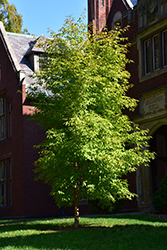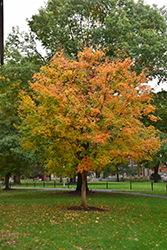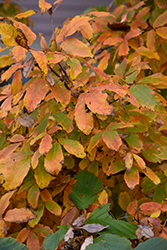Height: 30 feet
Spread: 30 feet
Sunlight:
![]()
Hardiness Zone: 4a
Description:
A great small landscaping tree noted for its interesting bark and fall colors, which tend to see multiple colors featured together on a single tree; not common, but worthy of greater use
Ornamental Features
Three Flowered Maple has dark green deciduous foliage on a tree with an upright spreading habit of growth. The compound leaves turn outstanding shades of yellow, orange and red in the fall. The peeling khaki (brownish-green) bark is extremely showy and adds significant winter interest.
Landscape Attributes
Three Flowered Maple is a deciduous tree with an upright spreading habit of growth. Its average texture blends into the landscape, but can be balanced by one or two finer or coarser trees or shrubs for an effective composition.
This is a relatively low maintenance tree, and should only be pruned in summer after the leaves have fully developed, as it may 'bleed' sap if pruned in late winter or early spring. It has no significant negative characteristics.
Three Flowered Maple is recommended for the following landscape applications;
- Accent
Planting & Growing
Three Flowered Maple will grow to be about 30 feet tall at maturity, with a spread of 30 feet. It has a low canopy with a typical clearance of 5 feet from the ground, and should not be planted underneath power lines. It grows at a slow rate, and under ideal conditions can be expected to live for 70 years or more.
This tree should only be grown in full sunlight. It prefers to grow in average to moist conditions, and shouldn't be allowed to dry out. It is not particular as to soil type, but has a definite preference for acidic soils, and is subject to chlorosis (yellowing) of the foliage in alkaline soils. It is somewhat tolerant of urban pollution. This species is not originally from North America.
Disclaimer - This resource is provided for informational purposes only and does NOT reflect current availability. Inventory varies seasonally, so we cannot guarantee that every plant will be in stock at all times - please contact your favourite GardenWorks location directly for current availability. It does not include our entire inventory of plants, so be sure to visit GardenWorks to see varieties that may not be represented on this list.



